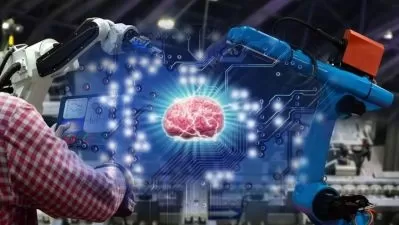Master Digital Twins: Industry 4.0 Implementation Pro Guide
Focused View
17:15:32
1 - Overview of Industry 40.mp4
04:52
2 - Fourth Industrial Era.mp4
03:35
3 - Key Technologies Part1.mp4
04:43
4 - Key Technologies Part2.mp4
23:45
5 - Benefits of Industry 40.mp4
06:27
6 - Challenges of Industry 40.mp4
08:09
7 - Introduction to Digital Twins.mp4
23:03
8 - Applications of Digital Twins.mp4
20:42
9 - History and Development.mp4
21:55
10 - Key Components.mp4
31:17
11 - Types of Digital Twins.mp4
32:30
12 - Overview of Digital Twin Architecture.mp4
01:47
13 - Layers and Components.mp4
06:59
14 - Layers and Components Part 2.mp4
20:40
15 - Key Consideration.mp4
09:09
16 - Key Consideration Part2.mp4
13:04
17 - Data Integration.mp4
17:26
18 - Data Integration Technologies.mp4
17:45
19 - Communication Protocols Introduction.mp4
11:45
20 - Major Communication Protocols.mp4
29:53
21 - Modeling and Simulation.mp4
04:14
22 - Types of Models in Digital Twins.mp4
05:32
23 - Types of Models in Digital Twins Part2.mp4
07:41
24 - Types of Models in Digital Twins Part3.mp4
03:36
25 - Types of Models in Digital Twins Part4.mp4
06:01
26 - RealTime Simulation Techniques.mp4
08:21
27 - RealTime Simulation Techniques Part2.mp4
13:12
28 - Predictive Simulation Techniques.mp4
11:42
29 - Realtime and Predictive Simulation.mp4
10:44
30 - Tools and Software.mp4
05:54
31 - Analysis of Tools.mp4
23:32
32 - Overview of Data Analytics.mp4
04:02
33 - Role of Data Analytics.mp4
15:56
34 - Types of Data Analytics.mp4
23:13
35 - Visualization and reporting.mp4
07:44
36 - AI and Machine Learning.mp4
10:00
37 - Role of AI and Machine Learning in Digital Twins.mp4
20:19
38 - Case Studies.mp4
04:37
39 - Realworld Examples.mp4
16:50
40 - Module Introduction.mp4
00:41
41 - Planning and Strategy.mp4
22:36
42 - Steps for Implementation.mp4
05:39
43 - Steps for Implementation Part 2.mp4
17:10
44 - Challenges and Solutions.mp4
15:55
45 - Challenges and Solutions Part 2.mp4
24:20
46 - Challenges and Solutions Part 3.mp4
18:36
47 - Best Practices.mp4
22:39
48 - Digital Twin in Product Lifecycle Management PLM.mp4
04:34
49 - PLM Overview.mp4
30:45
50 - Enhancing PLM.mp4
13:22
51 - How digital twins enhance PLM processes.mp4
16:25
52 - Industry Examples.mp4
13:30
53 - Industry Examples Part2.mp4
16:04
54 - Smart Manufacturing Overview.mp4
04:54
55 - Digital Twins in Smart Manufacturing.mp4
17:08
56 - Integration with IoT.mp4
13:44
57 - Understanding Digital Twins in Smart Manufacturing.mp4
17:41
58 - Case Studies.mp4
17:54
59 - Realworld Applications.mp4
12:39
60 - Digital Twins in Maintenance and Optimization.mp4
03:43
61 - How digital twins are used for predictive maintenance.mp4
22:26
62 - Techniques and Tools.mp4
31:16
63 - Process and Performance Optimization.mp4
03:31
64 - Process and Performance Optimization Part2.mp4
37:07
65 - Examples of successful maintenance and optimization using digital twins.mp4
27:36
66 - Future Trends and Innovations.mp4
02:30
67 - Emerging Technologies.mp4
20:02
68 - Emerging Technologies Part2.mp4
24:27
69 - Innovations in Digital Twins.mp4
23:50
70 - Future Outlook.mp4
20:12
More details
Course Overview
This comprehensive course provides expert training on Digital Twin technology and its practical applications in Industry 4.0, covering architecture, implementation strategies, and real-world case studies for smart manufacturing and predictive maintenance.
What You'll Learn
- Digital Twin architecture, modeling, and simulation techniques
- Integration with IoT, AI, and data analytics for Industry 4.0
- Implementation strategies for smart manufacturing and product lifecycle management
Who This Is For
- Manufacturing professionals transitioning to Industry 4.0
- Engineering students specializing in digital technologies
- Tech professionals exploring Digital Twin applications
Key Benefits
- No prerequisites - suitable for beginners and experts alike
- Practical case studies from real industrial applications
- Future-focused curriculum covering emerging trends
Curriculum Highlights
- Industry 4.0 Foundations & Digital Twin Basics
- Advanced Modeling & Simulation Techniques
- Smart Manufacturing Implementation Strategies
Focused display
Category
- language english
- Training sessions 70
- duration 17:15:32
- Release Date 2025/05/10





